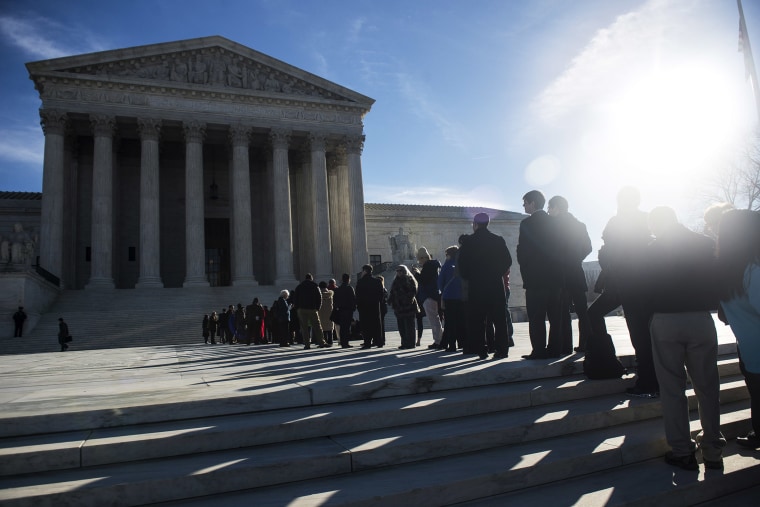Ordinarily, we think of the Supreme Court making historic news with a landmark ruling, but once in a great while, the high court produces a breakthrough by saying nothing at all.
In the wake of last year's decision striking down the Defense of Marriage Act, the federal courts have cleared the way for marriage equality in much of the country, including pro-marriage rulings in several federal appellate courts. Each of the rulings was appealed to the U.S. Supreme Court, and the thinking was the justices might take up one or more of the cases, ruling once and for all on the issue of same-sex marriage.
This morning, however, the high court announced it wouldn't hear -- in the parlance, it denied cert -- any of the cases, which allowed the lower court rulings to stand. That's a bigger deal than one might expect. Emma Margolin
reported this morning:
The Supreme Court on Monday rejected appeals to hear same-sex marriage cases out of Indiana, Oklahoma, Utah, Virginia, and Wisconsin -- all of which saw their bans fall in both federal district and appeals courts. The move immediately legalizes marriage equality in those five states, and will soon topple bans in six other states that make up the 4th, 7th, and 10th circuits. Those states include Colorado, Kansas, North Carolina, South Carolina, West Virginia, and Wyoming. That will bring number of states where gay and lesbian couples can wed from 19 plus the District of Columbia to 30 -- more than half the nation.
<div><object class="twitter-tweet" lang="en">
<h2><u>Top MaddowBlog Stories</u></h2>
<ul>
<li><a href="http://www.msnbc.com/rachel-maddow-show/boehner-mcconnell-sketch-out-misguided-plan">Boehner, McConnell sketch out a misguided plan</a>
<li><a href="http://www.msnbc.com/rachel-maddow-show/conservative-media-flip-out-after-obama-press-conference">Conservative media flip out after Obama press conference</a>
<li><a href="http://www.msnbc.com/rachel-maddow-show/win-yes-mandate-no">A win? Yes. A mandate? No.</a>
<li><a href="http://www.msnbc.com/rachel-maddow-show/some-colorful-characters-grab-hold-senate-gavels">Science denier on the Environment Committee, and other colorful characters to grab hold of Senate gavels</a>
</ul>
</object>
</div>'
But as a practical matter, it doesn't much matter to the millions of families living in the affected states -- as long as more same-sex couples are going to enjoy equal civil rights and be treated with dignity by their own government, the justices' motivations are irrelevant.
With additional rulings pending from the 6th and 9th Circuits, Mark Joseph Stern raises
the intriguing possibility that the Supreme Court may never weigh in because it may not be necessary: "If no circuit court
ever rules against gay marriage, the gay marriage question will be effectively settled, and the Supreme Court will never have to wade in again. It may be that the justices are hoping the lower courts rule uniformly on the issue -- thereby making United States v. Windsor stand for a fundamental constitutional right for gay couples to marry."
As always, Pete Williams' on-the-spot reporting is worth your time:
